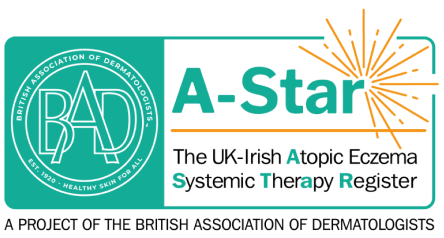
About the study
The purpose of the research study is to collect information from adult and paediatric patients with eczema, starting certain treatments, such as ciclosporin, methotrexate, azathioprine, or novel treatments, such as biologics and so-called ‘small molecules’. These medicines are referred to as ‘systemic immuno-modulators’ throughout this patient information leaflet. As eczema is often a long-term condition, it is important to establish how well these medicines work with regard to improvement in disease severity, quality of life and also safety, especially when these medicines are used for longer periods of time.
All medicines prescribed for eczema in the UK and Ireland have already undergone careful testing in clinical trials before being approved for use. However, as clinical trials are run for a relatively short period of time (on average up to a year), have limited numbers of participants compared with those which will be ultimately treated with the medicine and may exclude patients with additional diseases (co-morbidities), the picture we get from clinical trials is not complete.
The UK-Irish A-STAR project will therefore fill this gap in knowledge and collect information (data) on patients treated with systemic immuno-modulators attending regular dermatology clinics. Patients who have other health problems but nevertheless start one of these medications will also be included, making the results more representative of the “real world” use of these medicines. Rates of medical side effects will be compared between medications, and the results will then be used to provide clinicians and patients with a better picture of any potential increased risk of these therapies.
dditionally, this study will examine the ‘real-world’ cost of treating eczema, assessing the long-term expenses of these therapies in relation to their effectiveness.
Participants will be asked to provide a blood sample to help us better understand how eczema develops and why some therapies work better in some people, or cause more side effects in others. However, this is optional and you do not have to provide a sample if you do not wish to.
We plan to run this study for several years, for as long as possible, funding permitting. The study is funded by the British Skin Foundation (the UK’s main charity that supports skin disease research) and conducted in collaboration with the British Association of Dermatologists (BAD).
The study will run alongside your routine clinical care at the hospital; it will not influence this process at all. Therefore, there are no foreseeable additional medical risks associated with participating in this study.
We will ask you to donate one blood sample, which will be collected alongside other safety blood samples taken during routine clinical procedures. During the collection of the blood samples you may experience discomfort and there is a risk of bleeding and bruising around the puncture site but this is very rarely serious.
Although there are no additional clinical benefits from participation in the study, the information obtained from this study will help the study team to better understand eczema and to ultimately develop more targeted and effective treatments for future patients.
Your participation will involve the following:
- Completion of questionnaires and other survey forms about your health. You should note that some of the questions may be of a sensitive or personal nature. You are not required to answer all of the questions. It should take you about 10 min to complete these. Research shows that people with eczema were more likely to have asthma attacks and persistent asthma than people without eczema. If you have been diagnosed with asthma by your doctor, we would like you to complete an additional questionnaire.
- Agreement of your specialist to provide information of relevance to this study from your hospital medical records to the UK-Irish A-STAR study team at the St John’s Institute of Dermatology, Guy’s and St Thomas’ NHS Foundation Trust and King’s College London. This will be information regarding your medical history, the treatments you are receiving, assessments of your skin, details of any illnesses you may have and body measurements including height and weight.
- Attendance of study specific visits for as long as you wish, but for at least 12 months in six different appointments. Study visits will happen at the same frequency as would be required for standard care. On these occasions, the doctors will collect some clinical information about your progress, the side effects you may be experiencing and other medications you may be taking. Data from the usual assessments you normally have in clinic, such as blood samples or physical examination will also be collected for the study.
- At your initial visit a one off optional blood sample to look at your genes (DNA) will be collected. We will collect 12 ml (less than 1 tablespoon) via a blood sample alongside other standard safety blood samples. We would like to collect this data about you for at least 12 months, but much longer if possible and if you agree for us to do this.
We would like to collect this data about you for at least 12 months, but much longer if possible and if you agree for us to do this. You will be able to withdraw from the study at any time without any impact on your care.
We will analyse the DNA to understand why participants are more likely to suffer from eczema and why they respond better or worse to a specific treatment; we will not use the DNA to look at risk of developing any other diseases.
The samples will be labelled by the local hospital staff, who will protect the personal details, then sent to the designated laboratory by special post, analysed and stored securely in accordance with the Human Tissue Act and according to national Research Governance guidelines. Only staff members involved in this project will have access to the samples; none of the researchers testing these samples will have access to the participant’s personal details other than initials. We plan to store the biological samples for the duration of this study; afterwards we plan to store anonymously any remaining samples for future research into skin disease. In the consent form participants will be asked if they are happy to give permission for the storage and analyses of samples in future studies, not covered by the present research proposal; such studies will have had to be approved by a Research Ethics Committee. If participants do not consent to this point, the samples will be discarded at the end of this study.
Participate in the study
We can only register patients who are currently seeing a dermatologist in one of the centres that are participating in the study. Please speak to your local dermatologist about A-STAR to check whether you are eligible to join the study.
Data linkage organisations
In order to get a more complete picture of each participant’s health experiences, the study will link participant’s information with national providers of healthcare data. Some of the personal identifiable data will be collected (name, date of birth, national health number) for the purpose of obtain information such as any hospital admissions, details if participants are registered as having cancer, or in the event of death. This will enable these organizations to provide information about these events which may not have been reported via the local dermatology team.
There are different data providers in each area of the country. A summary of the linkage organisations we are planning to link with is provided below.
Currently there is no ongoing linkage.
Linkage Type Data Provider Cancer Registration Data (Malignancy) NHS Digital on behalf of Public Health England (PHE) Civil Registration Data (Mortality) Sourced from civil registration data and provided by NHS Digital on behalf of the Office for National Statistics Inpatient Admission NHS Digital (Hospital Episode Statistics) Linkage Type Data Provider Malignancy National Health Service Central Register (NHSCR) Mortality National Health Service Central Register (NHSCR) Inpatient Admission National Services Scotland (NSS) Linkage Type Data Provider Cancer Registration Data NHS Digital on behalf of Public Health Wales Civil Registration Data Sourced from civil registration data and provided by NHS Digital on behalf of the Office for National Statistics Inpatient Admission NHS Wales Informatics Service (Patient Episode Database for Wales) Linkage Type Data Provider Malignancy Northern Ireland Cancer Registry (NICR) Mortality Health and Social Care Business Services Organisation (BSO) Linkage Type Data Provider Malignancy National Cancer Registry Ireland (NCRI) Mortality National Cancer Registry Ireland (NCRI) Inpatient Admission Hospital In Patient Enquiry (HIPE)
Data and privacy
King’s College London and Guy’s and St Thomas’ NHS Foundation Trust are the sponsor for this study based in the United Kingdom. We will be using information from you and/or your medical records in order to undertake this study and will act as the data controller for this study. This means that we are responsible for looking after your information and using it properly. KCL and Guy’s and St Thomas’ will keep identifiable information about you for 5 years after the study has finished.
All your data will be stored in accordance with the General Data Protection Regulation (GDPR), the Data Protection Act 1998 and the International Conference on Harmonization for Good Clinical Practice. Once you provide consent, your data will be held on a secure confidential database for the purpose of this study, to which only the Chief Investigator and approved delegated members of the study team will have access (at King’s college London and Guy’s and St Thomas’ NHS Foundation Trust). This information will be entered into the database by your dermatology team following your hospital appointments. Your details on this database will be anonymized. Information will be sent using a secure network, and the data will be stored on a secure server.
King’s College London and Guy’s and St Thomas’ will collect information from you and/or your medical records for this research study in accordance with our instructions. We will use your name, date of birth, hospital number, NHS ID / CHI ID (or any other relevant local healthcare number) and contact details to contact you about the research study, and make sure that relevant information about the study is recorded for your care, and to oversee the quality of the study. Some of your personal identifiable data will be collected (name, date of birth, national healthcare number) for the sole purpose to be shared with national providers of healthcare data. This will be used to obtain information such as any hospital admissions you have had, details if you are registered as having cancer, or in the event of your death. This will enable these organizations to provide information about these events which may not have been reported via your dermatology team, and will give us a more complete picture of your health experiences. There are different data providers in each area of the country, and a summary will be provided on the appendix of this information sheet, however this list may change over time. A complete and up to date list of the national data providers linked with A*STAR will be maintained on the study website.
Individuals from KCL and Guy’s and St Thomas’ and regulatory may look at your medical and research records to check the accuracy of the research study. The research team will pass these details to KCL and Guy’s and St Thomas’ along with the information collected from you and/your medical records. The only people at KCL and Guy’s and St Thomas’ who will have access to information that identifies you will be people who need it for data linkage, follow up or to audit the data collection process.
There are many collaborators on this research. By signing the consent form you are agreeing that your anonymized study data can be shared with research collaborators and industry partners, who may be located outside of the country or region in which you live. Your study data will always be kept confidential, secure and anonymized and used only for the purposes of research for this study.
Your rights to access, change or move your information are limited, as we need to manage your information in specific ways in order for the research to be reliable and accurate. If you withdraw from the study, we will keep the information about that we have already obtained. To safeguard your rights, we will use the minimum personally-identifiable information possible.
The UK-Irish A-STAR project at The St John’s Institute of Dermatology, Guy’s and St Thomas’ Hospital NHS Foundation Trust and King’s College London will ensure that your data is processed fairly and lawfully in accordance with the Data Protection Act 1998. We have a number of rigorous procedures in place to protect your personal data and keep it secure as follows:
- Computer security is in place to block unauthorised access to the computers/systems that hold personal information. Personal identifiable data will be held in an encrypted format at your local investigator’s office, and later transferred to Guy’s and St Thomas’ Hospital/King’s College London. Encryption allows information to be stored in a secure manner making it accessible to the research team (named by the study’s Principal Investigator or Chief Investigator) only with the use of a username and password. Your identifiable data will not be shared with any other parties other than for the purpose of linkage with healthcare providers.
- If your data is provided as part of a larger dataset to researchers outside of the UK-Irish A-STAR team, information that could identify you will not be provided.
If you are a participant within the UK, you can contact the Information Commissioner’s Office. The ICO is the UK’s independent authority set up to uphold information rights in the public interest, promoting openness by public bodies and data privacy for individuals.
If you are a participant within the Republic of Ireland, you can contact the Data Protection Commissioner. The Office of the Data Protection Commissioner (Irish: An Coimisinéir Cosanta Sonraí) is the independent national authority responsible for upholding the EU fundamental right of individuals to data privacy through the enforcement and monitoring of compliance with data protection legislation in Ireland.
As part of the process of enrolling with this study you and/or your Legal representative may have been given the A-STAR Patient Information Leaflet. For a quick reference to key information regarding your participation in the trial, you might find the following Frequently Asked Questions section useful.
Frequently asked questions
As part of the process of enrolling with this study you and/or your Legal representative may have been given the A-STAR Patient Information Leaflet. For a quick reference to key information regarding your participation in the trial, you might find the following Frequently Asked Questions section useful.
The research does not alter the treatment you receive. Your specialist will start and stop treatments as determined by your clinical condition.
We plan to conduct this study in collaboration with other centers (clinicians and researchers of other Dermatology Departments). It is also possible that pharmaceutical companies might invest in the study in the future. Study results may be shared with these collaborators, but you will not be identified. You may obtain further information about all study collaborators via our website. There is a possibility that anonymised medical information may be sent outside of the UK or Ireland for analyses. By signing this consent you are agreeing to this transfer.
The hospital medical records will state that you are in this Register. By signing the study consent form, you are allowing the dermatology team to permit these records to be viewed by the A-STAR team at The St John’s Institute of Dermatology, Guy’s and St Thomas’ NHS Foundation Trust London/King’s College London, or possibly agencies such as authorised members of the Research Ethics Committee or the Hospital Trust. This is for the purpose of checking that the data is correct or checking that the study is being carried out properly.
If you have a concern about any aspect of this study, you should ask to speak to the researchers who will do their best to answer your questions. If you remain unhappy and you wish to complain formally, you can do this through your hospital’s Patient Advisory Liaison Service (PALS) at NHS hospitals (in the UK), or the Complaints Officer at HSE hospitals (in the Republic of Ireland).
In the event that something does go wrong and you are harmed during the research you may have grounds for legal action for compensation against your treating Hospital, Guy’s and St Thomas’ NHS Foundation Trust London and/or King’s College London, but you may have to pay your legal costs. The normal National Health Service or Health Service Executive complaints mechanisms will still be available to you (if appropriate).
Participants are asked to discuss any concerns they might have with their dermatology team.
You can withdraw from the study at any time after giving your signed consent by contacting your local dermatology research team. You will be given a withdrawal form where you can state your will. Unless you tell us otherwise in the form, we will keep all the samples and clinical information that we have obtained up until the point of withdrawal, and we will not collect any further information or samples. If you decide to withdraw from the study, your standard of care will not be compromised in any way.
If during your participation in this project you lose your capacity to express consent to continue in the study, we will retain all data and tissue already collected with previous consent but we will withdraw you from the study and no further research procedures will take place.
Before any research study can go ahead, it has to be checked by a Research Ethics Committee and the Health Research Authority (in England) to make sure that the research is fair and transparent. The Wales Research Ethics Committee 1 has reviewed and approved this study. The Research & Development team at your hospital must also approve the study.
The study is being co-ordinated and sponsored by The St John’s Institute of Dermatology at Guy’s & St Thomas’ NHS Foundation Trust and King’s College London. The researchers at Guy’s and St Thomas’ NHS Foundation Trust are Prof Carsten Flohr and Prof Catherine Smith, Consultant Dermatologists. If you have any concerns about any aspect of this study, you should speak to your local researcher who will do their best to answer your questions. If they are unable to resolve your concern or you wish to make a complaint regarding the study, please contact the Research Practice Governance Co-ordinator (in the UK) / Complaints Officer (in Ireland) or Chief Investigator and follow the complaints procedure.
Regular updates and results of the research will be shared on this site.
Any study results or published reports using the data will be anonymised prior to publication, so that it is not be possible to identify the participants.
Study results will also be published in medical journals, as well as disseminated through the information channels of the British Association of Dermatologists and eczema patient organisations. These will also be available to the consultant whom you can contact for further information.
Unit for Paediatric & Population-Based Dermatology Research, St John's Institute of Dermatology





